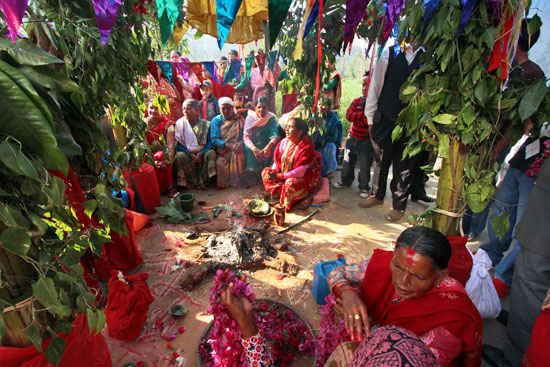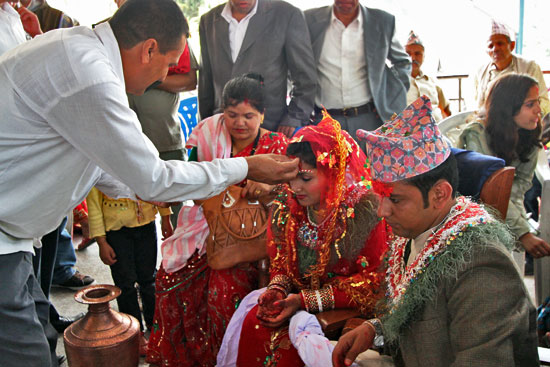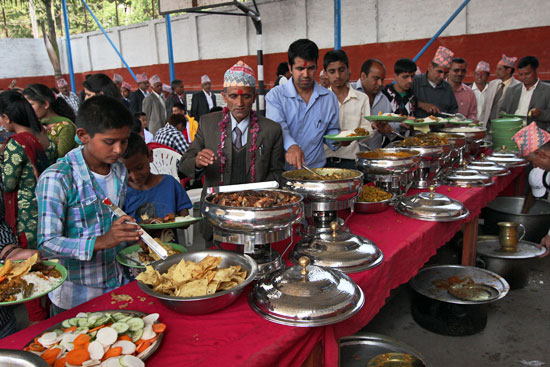In Nepali culture, special ceremonies called pujas are held to give a name to a newly born child, for the child’s first haircut, a person’s 84th birthday, and for the passing of a relative. Last year I was invited to attend a puja to memorialize the death of a beloved aunt of my adopted Nepali family, which was held on the one year anniversary of her passing. This year I witnessed the other end of the spectrum when I attended the Bibaha Puja (a Hindu wedding ceremony) for my Bahini’s (little sister’s) nephew.
We left Pokhara as the sun was rising, destined for Bahini’s home village of Lekhnath, about an hour down the road. By the time we arrived at the home of the groom’s parents, festivities were in full swing. A traditional band of musicians squatted on the ground, horns bellowing and drums booming, as guests made their way to the backyard, where the groom was seated on a chair. He was dressed in the traditional white daura suruwal, a specially woven outfit made out of dhaka fabric, with a regular suit coat jacket on top. On his head he wore a topi, the national hat of Nepal, and around his neck hung an elaborately woven necklace of Dubo grass. This grass necklace, known as a Dubo ko Malla, symbolizes an everlasting relationship because Dubo grass will grow without roots.

Using a provided tray of colored powders and rice, each family member placed a tika on the forehead of the groom and then accepted a gift from the father of the groom. Meanwhile, women were running around, shoving plates of food in everyone’s hands. I wasn’t very hungry but I picked at the selroti fried rice rings and tooth-breakingly hard, overly sweet rice balls that are traditionally served at a wedding and was later glad I had. The plan had been for me to stay at the groom’s house all day with Bahini, but somehow I got swept up in the crowd and ended up on one of the buses that were bound for Chitwan, home of the bride and location of the Hindu wedding ceremony.
For hours we sweltered and jounced over rough potholed roads carved into the mountainside alongside a spectacular gorge. I held my breath each time a truck approached from the opposite direction, envisioning our big pink bus plummeting thousands of feet to river below as we inched ever closer to the edge. Through it all, the band played uninterrupted, perched on the roof of the bus, until we finally arrived at the temple in Chitwan.
I followed the groom and his entourage up to the second floor pavilion and muscled my way into the center of the room where the groom was seated. Arms reached out and pulled me aside to make way for the bride. Dressed in an exquisite green and red sari, her face covered with a jewel-studded green and red lace veil, the bride was slowly escorted to the center of the room by her two attendants. Per tradition, her eyes remained downcast and her countenance was sad; I couldn’t help but wonder if the requisite sadness had something to do with the fact that this Hindu wedding, as with most in Nepal, had been arranged. Prior to the wedding, the bride had met her intended once, perhaps twice.
The groom stood to meet his bride and she circled him three times, pouring water from a silver pot on the floor before her. The couple faced one another and a second Dubo ko Malla was unwrapped and handed to the bride. To loud applause from the onlookers, she tied it around the groom’s neck, covering the one he was wearing. The groom then removed his garland and tied it around the bride’s neck. This was followed by an exchange of wedding rings, again accompanied by cheers from the guests.

For the next several hours, prayers, anointing, vow-taking, and gift giving continued uninterrupted. Since the bride had no father, her uncle (the eldest male head of her household) ceremoniously placed tikas on the forehead of all members of the groom’s family and presented gifts to them as an expression of gratitude that the groom had consented to the marriage. The most important male members of the groom’s family received gold ring and all men received a topi, the national headgear of Nepal. Additionally, every guest of the groom’s family received an envelope of cash. Even I, as an adopted member of the extended family, was honored with a tika and gift of cash.
Meanwhile, on the lower level of the temple, guests feasted at a sumptuous banquet and danced with abandon as the band played on. As dusk was gathering, the bride’s dowry – armoire, bed, end tables, bedding, refrigerator and television – was loaded atop one of the buses as guests clambered aboard for the trip back to Lekhnath. Hours later we pulled up to the groom’s home, where a wild party was underway. One person at a time stepped into a dimly lit circle and danced to the rhythmic beat of drummers, turning in circles with gracefully extended floating arms. I hid in the dark fringes but the family wasn’t about to let me off so easily. Hand over hand, I was sent to the front, where the guests insisted I dance. Embarrassed by my sandals and khaki pants in the midst of all the jeweled saris and kurtas, I twirled a few times in my clumsy way and when joyful applause broke out, fled back into the black anonymity of the night.

Finally, the newlyweds arrived and the groom’s mother greeted them with great ceremony, applying a tika to their foreheads and making an offering of fruit and incense. The bride took one long step over the threshold, where she will begin her life as a married woman, living in a home she has likely never seen, with people she does not know. While the couple retired to their wedding chamber, the guest danced wildly and long into the night, celebrating the union.
In Nepal they have a saying: “Marriage first, love later.” Though love marriages are becoming more common, most Hindu weddings are still arranged by the families, and more than 90% of the young women I have spoken to about arranged marriage indicate they prefer this to love marriage. It is mind-boggling to my Western way of thinking, but it seems to work for them, and there may be something to the idea that parents know better who is a suitable spouse for their child.
Considering a future visit to Nepal? You’ll want to check out my Essential Travel Guide for Pokhara, Nepal, which is updated regularly.

A question… here in the US it is the custom for guests of the wedding opt bring a gift. What is the custom in a Nepali wedding; do the guests give any type of gift? Thanks! We want to be appropriate to their culture, so if gifts are appropriate, what sorts of gifts are considered optimal? Thanks!
Hi James: It is quite the opposite in Nepal and India. The father of the bride gives cash presents to everyone who attends the wedding, and delivers more cash gifts in person to family who couldn’t attend after the wedding. Guests are not expected to bring anything, in fact, bringing a gift for the couple would be so uncommon that they would not know what to with it.
I just came across your blog and wanted to say that I really enjoyed reading about Nepali village wedding. It must be a complete Nepali experience for you. I have already subscribed to your feeds. You have a great blog……and if you have free time, please check my site……Tasteofnepal.blogspot.com.
Hi Jyoti: Thanks so much for your lovely comment and I’m glad you enjoyed my article about my Nepali family’s wedding. I read your blog with great interest, especially the post about the greens. I live in Pokhara about three months each year, with a local family, so I’m familiar with most of them. However, I didn’t see two of my favorites: Siplikan (the tender shoots of the Boston fern), and Yam leaves. My third favorite, Pharsi ko munta, you mentioned. After reading your post I’m longing for Nepal.
Very interesting. Thanks for giving us an eye on this wonderful celebration.
You’re welcome Talon. Glad you found it interesting.
“…her
eyes remained downcast and her countenance was sad”
That’s what the brides usually look like, since they’re leaving their parents and family. A lot of times, the brides cry at the end when they’re preparing to leave for their spouses house.
And being Nepali, I can tell you that the arranged marriages really do work. My parents had an arranged marriage, and have been happily married for +15 years. And both sets of my grandparents also have had an arranged marriage, and are still married. And basically the same to all my family members.
So, in Nepal arranged marriages are actually not a bad thing, and are very successful.
As for the wedding ceremonies, I really love weddings in Nepal. It’s really hectic, and really fun to be a part of it. ^.^
I agree Jasana! It was a wonderful event to attend. And there may indeed be something to the arranged marriage idea, though I think some stay together because it is taboo to be divorced.
Sounds like a fascinating festival that it was an honour to be part of.
I love these weddings. They are colorful and exotic and arranged marriages are generally more successful than that of ‘normal’ ones.
Having attended a Greek wedding when I was on holiday there recently I know how weddings are so full of the local traditions – fascinating to hear about how they do it in Nepal. I must admit I can imagine how the bride must feel somewhat apprehensive and hope that all will work out as she hopes in her marriage
A friend of mine had an Indian wedding, and whilst I was unable to attend the ceremony, I did get to see the video of the four day event. And what an event! Knocks the British one day piss up into a cocked hat 😉
This sounds so interesting! What a great tradition to be able to experience, even if they did force you to dance! It is strange to think about an arranged marriage, but I can imagine learning to care for and love the person simply because they do become such a big and important part of your life.
hi…its not strange at all……its belief, it’s my heritage. I am a Nepali, have studied in Nepal till 12th, then I moved to India and completed my Chartered Accountancy (CPA) and now a couple of years back I completed my MBA from Harvard Business School…..I am not even 30, have my own successful consultancy firm and earn around a million dollars annually yet when i plan to get married, i am gonna go for arranged marriage, marrying where my parents want me to and will take care of her no matter what as the bond of marriage among us Nepalese is above all, above everything else…..its sacred, i might live in dissatisfaction all my life but will keep my wife and my relatives happy till the very end…………
i like your comment because you love your system of marrige
I just heard about a Nepali wedding from a good friend who returned for his sister’s wedding. Sounds quite the ceremony with colour (especially reds?), ritual, community and loads of food. On arranged marriages, I believe that there are enough stats around to show that they survive as well and successfully as what marriages do based on finding your own partner.
What a wonderful way to embrace the culture. It’s hard to understand the tradition of arranged marriages in this day and age, but it is their custom, so who I am to judge.
Nancie: That’s exactly my attitude – not my place to judge.
I could really go for some of that food…
Hogga, I hate to tell you this, but I had diarrhea for 24 hours after eating it!
If you had been in a situation where the airline services were poor. Post your #unfAIR airlines treatment photo to win. BUST THE AIRLINE! Onekontest.com/FlyerDefendersPC